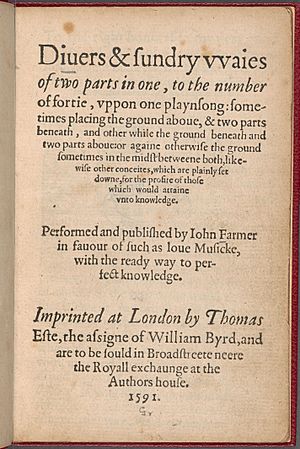John Farmer (composer) facts for kids
John Farmer (born around 1570, died around 1601) was an important composer from England. He lived during the time of Queen Elizabeth I. John Farmer was famous for his beautiful songs called madrigals. He also wrote skillful music for church psalms, arranged for four voices.
John Farmer's Life and Career
John Farmer was born in England. We don't know his exact birthday. Some historians think he was born around 1564 or 1565. He was supported by a powerful person, the Earl of Oxford. Farmer dedicated some of his music to him.
In 1595, John Farmer became the organist at Christ Church Cathedral, Dublin. An organist plays the organ, a large musical instrument. At the same time, he was also the organist at St Patrick's Cathedral, Dublin. He was also in charge of the children's choir there.
In 1599, Farmer moved to London. He published his only collection of four-part madrigals. Madrigals are songs for several voices, usually without instruments. He dedicated this collection to Edward de Vere, who was also the Earl of Oxford.
John Farmer's Music
One of John Farmer's most famous pieces is "The Lord's Prayer." Many churches and cathedrals still perform it today. You can often hear it in Britain. This piece is even in a special music book called Oxford Choral Classics.
Another composer, Giles Farnaby, wrote a special dance piece for Farmer. It was a pavan, a slow, stately dance. This piece is in a famous collection of music called the Fitzwilliam Virginal Book. It's known as Farmer's Paven.
John Farmer's book, Divers & Sundry Waies, was very important. It contained many musical ideas. Later, a book by Michael Maier called Atalanta Fugiens used Farmer's ideas. Many of the three-part fugues in Maier's book were based on Farmer's compositions. A fugue is a type of musical piece where different parts play the same melody at different times.
Selected Works
- Fair Phyllis I Saw Sitting All Alone
- Fair Nymphs, I Heard One Telling
- A Little Pretty Bonny Lass
- Take Time While Time Doth Last


